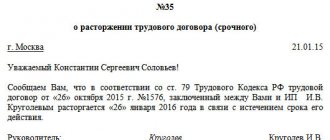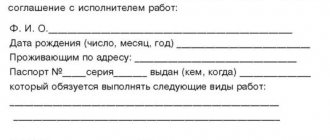What is the difference between a fixed-term employment contract and an open-ended one?
According to the legislation of the Russian Federation, an employment contract is concluded with each employee.
The position of the employee in labor relations will be a higher priority for the state than the interests of the enterprise. An employment agreement can be either fixed-term or indefinite. Usually they are opposed to each other. Let us give their definitions.
A fixed-term employment contract is a contract between an employer and an employee for a period of time limited by a time frame written on paper. In the absence of this provision, it goes into the category of contracts not limited in duration. According to the law, a reason is required to enter into this agreement.
An open-ended employment contract is a contract between an employee and an organization, signed for an indefinite period. An employee is hired not for a one-time job, but for a continuous one.
The difference between such contracts is already defined in the names. In urgent terms, the boundaries of its action are indicated; in unlimited terms, this is not the case. The first must indicate the reason for signing this particular contract.
Differences in a fixed-term and unlimited-term contract:
- Time limit: Urgent – specified end date.
- Indefinite – the period is not specified.
- Urgent - according to labor legislation, the reason for the conclusion must be indicated.
- Urgent - an employee is hired to solve a specific task.
The Labor Code of the Russian Federation specifies all the conditions on the basis of which an employer must issue a fixed-term employment contract. When concluding an agreement, the reasons that led to the employment of an employee for a fixed period must be included in the agreement. The reasons must not only be given, but also proven. If this is not done, the agreement will become permanent (Article 58 of the Labor Code of the Russian Federation).
When determining the term of the contract, to avoid misunderstandings in the future, it is worth specifying the end of the term. In some cases, it is impossible to specify the validity period and expiration date of a fixed-term contract. For example, on maternity leave. The end of the agreement between the parties will be associated with the employee’s return from vacation. Such contracts indicate that their duration coincides with maternity leave.
After the agreement is signed by both parties, the employee performing personnel functions makes an entry in the work book without indicating the type.
Let us highlight the main points that should be taken into account when making a fixed-term contract:
- Seasonal work.
- The reason for the fixed-term contract is specified in the agreement.
- The duration of the trial month is no more than 2 weeks.
- Two working days of the month are due for each working month: Work up to two months (coincides with seasonal work).
- Depending on the specially created temporary organization, the term of the agreement accepted on such terms by workers depends.
- An employee is elected to a position by election.
When it comes to pensioners, many employers seek to conclude a fixed-term contract with them. It can only be signed by agreement on both sides. Upon reaching retirement age, the manager does not have the right to transfer the employee from an open-ended employment agreement to a fixed-term one. Such employees can continue to work under the conditions specified in the original agreement.
When hiring, the employer enters into an employment contract with the employee in accordance with Art. 58 of the Labor Code of the Russian Federation. An employment contract between an employee and an employer is usually of unlimited duration. But it happens that an employer needs an employee for a while, and a fixed-term employment contract is concluded with him. According to Art. 59 of the Labor Code of the Russian Federation, a contract can be fixed-term in cases where an employee is hired:
- during industrial practice;
- for the duration of the work, the list of which must be indicated in the contract;
- if the organization was created for certain work or for a certain period;
- for the period the employee performs seasonal work;
- for assignment to work in foreign countries;
- during the absence of an employee whose job is retained, etc.
The main point of a fixed-term employment contract is the period for which this contract is concluded. The employer must clearly decide how to indicate the term in the employment contract. The Labor Code regulates the indication of the term in a fixed-term employment contract, but there are no clear regulations on its wording.
As a second option, a number of lawyers suggest indicating clear deadlines “from...” and “to...”, and, if necessary, signing an additional agreement to extend the period. But this may lead, as mentioned earlier, to the recognition of the contract as indefinite.
It is quite simple to formalize an agreement between the parties; the employer offers the temporary employee a vacant position - and the employee agrees. An employee can also write an application to transfer him from a temporary contract to a permanent one. The Labor Code in Article 59 states that in the absence of initiative of one of the parties and the continuation of the work of a temporary worker, the contract automatically becomes permanent.
When a candidate is hired, a test may be imposed on him. However, when hiring under a fixed-term employment contract, there are a number of restrictions contained in Art. 70 Labor Code of the Russian Federation. If the employment contract is concluded for a period of less than 2 months, then no test is established. If the employment contract is valid for up to six months, the probationary period cannot exceed two weeks.
We invite you to familiarize yourself with: How to draw up an agreement with an individual entrepreneur for the provision of services, sample and rules for drawing up
Another nuance of an employment contract concluded for a limited period is the grounds for dismissal of the employee. In accordance with Article 79 of the Labor Code of the Russian Federation, there are several grounds for termination of a fixed-term employment contract:
- the arrival of a specific period specified in the contract;
- completion of certain work by the employee;
- return to work of an employee during whose absence a new employee was hired.
But there is also a limitation on the period of notice to the employee about the termination of the employment contract. Thus, when hiring an employee for a period of up to two months, the manager must notify the employee at least three days before the expiration of the contract. When hiring an employee during the absence of a permanent employee, the employment contract is terminated when this employee returns to work. A permanent employee is not required to notify management of his resignation, but the employer may agree with the permanent employee.
To summarize, we can say that the differences between a fixed-term and an open-ended employment contract are the indication of the period in the employment contract, the limitation for establishing a trial and the grounds for termination of the contract.
- A fixed-term agreement is concluded by the parties for a certain period. After the expiration of the specified period, the employment agreement may be terminated.
- The difference between an open-ended employment contract is the fact that this agreement does not have any time limits.
In Art. 58 of the Labor Code of the Russian Federation states that an employment agreement is concluded for a definite or indefinite period.
The parties have the right to conclude an urgent TD if there are grounds provided for by law (Article 59 of the Labor Code). An employment agreement, which is concluded for a specific period in the absence of serious grounds established by the court, is supposed to be considered concluded for an indefinite period (Part 5, Article 58 of the Labor Code).
A fixed-term employment agreement can be concluded for a period of no more than 5 years (in the case where the Labor Code of the Russian Federation or another federal law does not establish a different period). TD may be urgent in certain cases when an employee is hired by the company:
- for the period of industrial practice;
- to send a worker to other states;
- to perform work, the list of which is specified in the contract;
- while the specialist is performing seasonal work;
- if the enterprise was created for specific work/for a specific period.
Who is the STD concluded with?
The main point of a fixed-term employment contract is the period for which this contract is concluded. The employer must clearly decide how to indicate the term in the employment contract. The Labor Code regulates the indication of the term in a fixed-term employment contract, but there are no clear regulations on its wording.
The first wording option is to copy the required paragraph from the Labor Code.
An open-ended contract is concluded for an indefinite period. This form of labor relations between the parties is present when an employee is needed not for one-time projects, but for an indefinite period. An open-ended contract cannot become a fixed-term one. Even if the parties agreed to this. A fixed-term contract can become indefinite.
This happens if, after its expiration, the person continues to work at the enterprise or organization. In this situation, the condition on the urgency of the contract ceases to have legal force. In a fixed-term and open-ended contract there is a difference in additional conditions. In a fixed-term contract, it is necessary to indicate the reason why a person is hired on such conditions. Purposes of the conclusion. A fixed-term type of contract is issued for the implementation of a specific work task or production cycle.
- Managers, deputies and chief accountants.
- With full-time students.
- Employees working part-time.
- Hiring creative workers (media, concert and film organizations, etc.).
- Hiring workers to eliminate the source and consequences of emergencies (accidents, emergencies and disasters, etc.)
- An employer is a small business entity whose number of employees does not exceed 20–35 people.
- Performing work in areas with harsh climatic conditions (for example, the Far North).
- When hired for part-time work.
- Hiring employees undergoing full-time training.
- Hiring employees for management and accounting positions.
- Advantages For the employee: If the duration of the agreement has expired, and the employee continues to perform his work duties, and neither party demands termination of the employment contract, then the latter becomes indefinite (from Article 58 of the Labor Code of the Russian Federation).
- performing duties for a temporarily absent employee;
- period of temporary work for up to 2 months;
- with employees who travel abroad for official purposes;
- performance of official duties related to the expansion of production (up to 12 months), or services provided beyond the scope of production;
- with employees entering work in organizations created for a certain time in order to perform certain work;
- with persons who are hired to perform certain official activities: the time of their completion cannot be determined by a specific date;
- to perform job responsibilities related to the internship and training of a specific person;
- with persons who are sent from the Employment Service to temporary and public works;
- with persons sent to perform alternative civil service, etc.
- absence of the main subordinate (vacation, maternity leave, long business trip);
- performing seasonal or temporary work;
- work activity must be carried out abroad;
- for temporary performance of an increased amount of work;
- the company was created for a specific period and needs temporary employees;
- the employee works during an internship or training period;
- the subordinate is sent to the enterprise by the employment center;
- the employee is a pensioner;
- the work cannot be performed under a regular contract due to medical testimony.
We suggest you familiarize yourself with: Bedroom area according to snip. Minimum area of living rooms
Open-ended agreement
This form of cooperation is a little different from fixed-term and open-ended contracts. At least because the contract is governed not by the Labor Code, but by the Civil Code. Its essence lies in the fact that the employee (or, in legal terms, the contractor) must complete the work within the established time frame and deliver it to the customer, who will pay for it.
Advantages for the employer: the contractor is not registered as a staff member; if the contract provides for this, the employment relationship with him can be terminated at any time. The person performing the work is not subject to guarantees and compensation provided by labor legislation, for example, payment for overtime work, work on weekends. He is not granted labor and social leave.
Disadvantages for the employer: the employer pays contributions to the Social Security Fund for the contractor, as well as for insurance against accidents and diseases received during the performance of work.
Advantages for the employee: complete freedom, that is, the employer only cares about the result of the work, and not how exactly it was performed. There are no obligations regarding labor discipline.
Disadvantages for the employee: the employee is not provided with labor and social leave, and no entry is made in the work book. It is not subject to guarantees and compensation provided for by labor legislation.
How is a contract different from an employment contract?
- An open-ended employment contract is concluded for an indefinite period, a contract - from 1 to 5 years.
- According to the contract, the employee cannot resign of his own free will - an agreement between the parties is required. With an open-ended contract, the employee can simply write a letter of resignation, and after a month he can get a new job.
- The employer has additional grounds for terminating the contract. For example, material damage.
- With a contract, wages are paid at least once a month, with an open-ended contract - at least twice a month.
How does a fixed-term employment contract differ from an open-ended one?
The employee's resignation must occur by mutual agreement of the parties. For the employer: Employee pregnancy. In this case, the employer cannot terminate the employment contract. Moreover, if a woman demands an extension of the period during which the agreement will be valid until the end of pregnancy, then the employer is obliged to satisfy this demand (Article 261
For how long can an employment contract of this type be concluded? An open-ended employment contract is concluded to perform permanent work for a long or indefinite period of time.
In a number of cases, a probationary period is prohibited:
- When filling a position, selected by competition.
- Women who are pregnant or with children.
- Minors.
- Graduates of educational institutions working for the first year.
- When transferring from another place of work.
There are certain nuances for pregnant women. As you know, a pregnant woman cannot be fired (with the exception of liquidation of an organization), but in determining a fixed-term agreement, the employee takes into account the time of replacement of a maternity position or the seasonality of work.
When hiring, the employer and the applicant enter into an employment contract. Any agreement contains the terms under which the parties agree to cooperate with each other. The conditions can be significant and additional: both must be included in the text of a full-fledged employment contract. But there is a fundamental difference here. If the essential terms are not reflected in the text of the contract, it is considered invalid.
Additional terms and conditions may not be included, but this is not advisable. The main condition for concluding a contract is its freedom.
Labor legislation obliges employers, when hiring workers to perform a particular job, to enter into written cooperation agreements with them. Such an agreement is an employment contract. The rules for its conclusion are spelled out in detail in the Labor Code of the Russian Federation.
- Working conditions, that is, may imply a standard five-day week or a shift schedule, as well as prescribe rotational, night or other type of work.
- Types of employers. The employer can be either a legal entity or an individual.
- The types of relationships concluded can be primary, temporary, seasonal or part-time, at home, remotely.
- The status of the employee himself. The following groups are distinguished: minors, foreigners who do not have any citizenship, disabled people, working pensioners, persons with family obligations.
- Length of working day - full or part-time, irregular schedule.
- The reason for the cooperation that arose, whether the person was elected, passed through a competition, appointed, reinstated by a court decision, sent to work.
- Categories of employees.
- Simplified dismissal procedure. The employee is dismissed after the end of the contract period or after completing the work specified in the document.
- Shortened dismissal period. The employee is notified either 3 days before the end of work, or the day before the main employee leaves (Article 79 of the Labor Code of the Russian Federation).
Of the general features, only a limitation on the duration of work can be distinguished - in both cases, the date of employment and the date (or event) of completion of work can be specifically established. However, a fixed-term employment contract cannot be concluded for a period of more than 5 years, but a civil law one can.
Open-ended agreement
It is concluded for a certain period.
A fixed-term contract is an agreement concluded for a specific time. Most often, this type of contract is used for seasonal work, for employment as a substitute employee (on sick leave or maternity leave), and so on.
After the end of the fixed-term agreement, it can be replaced with an open-ended one or terminated permanently. Most often, this issue is resolved through negotiations between the parties.
If none of the participants demanded to sever the relationship after the end of the validity period of the document, then such an agreement is already indefinite.
It is important to note: a fixed-term document has the same guarantees as an indefinite one. That is, an employee working under such an employment agreement is entitled to vacation, sick pay and other social compensation from the state.
An open-ended employment contract implies a relationship without a specific period of validity; in particular, such relationships can be terminated at the initiative of the parties or by decision of a judicial authority.
An open-ended contract, just like a fixed-term one, regulates for the employee and manager not only their rights and powers in labor relations, but also guarantees for the provision of social opportunities. The validity date of such an agreement is not established.
How to convert a fixed-term employment contract into an open-ended one
https://youtu.be/nP98WgZ0qSE
The transfer of a temporary TD to a permanent one can be carried out by agreement of management or the employee himself, as well as by decision of the competent authority. If the dismissal deadline was missed or the termination of the fixed-term employment agreement was not formalized, the enterprise specialist may not agree with the termination of the temporary labor agreement. An employee of an enterprise has the right to apply to special authorities, but must follow the procedure described in labor legislation.
Chapter 60 of the Labor Code of the Russian Federation states that a specialist has the right to demand consideration of a dispute regarding disagreement with the termination of the contract instead of transferring it to an indefinite one. The dispute is considered by a special commission on labor disputes. This commission is formed at the request of a specialist from representatives of the employer and workers. The commission has the right to side with the specialist, recognizing an urgent TD as indefinite.
The employee also has the right to apply to the Federal Labor Service (Chapter 57 of the Labor Code of the Russian Federation). You should contact the regional office at the location of the employer. The FTS, after considering the materials on the labor dispute, may conclude that there are grounds for transferring the temporary labor agreement into a permanent employment agreement.
The court remains the main defender of the interests of the worker. All the nuances of going to court and the procedure itself are described in Chapter. 60 Labor Code of the Russian Federation. According to a court decision, the employer may be required to make the temporary TD permanent.
Renewal of an employment agreement due to the inclusion of a term clause is possible only with the consent of the enterprise employee. To do this, you must sign an additional agreement to the TD. This additional agreement may also indicate changes in the specialist’s job responsibilities.
When drawing up an additional agreement, the following criteria must be strictly observed:
- you can sign a document changing the term of the contract only if there is an objective opportunity to transfer the specialist to a fixed-term contract;
- additional conditions should be included in the agreement regarding changes in the term, working conditions that can improve the employee’s situation (for example, an increase in pay);
- changing the deadline must necessarily be carried out within a wider range. This saves time on repeatedly re-signing the contract and prolonging the agreement.
Order to transfer an employee from a fixed-term employment contract to an open-ended one
Employment under a fixed-term contract is permitted under certain conditions and circumstances established by the Labor Code. There are a number of restrictions on the transfer of an open-ended TD to a fixed-term one, and this reduces to a certain extent the employer’s ability to regulate labor relations with hired personnel.
We invite you to familiarize yourself with: Sample contracts for the provision of a service apartment
All stages of the procedure (preparation, approval, certification by employee signatures) must be carried out in accordance with the rules of the Labor Code of the Russian Federation. The Labor Code does not regulate transfer to urgent TD. Typically, such a translation is not beneficial to a company specialist.
Full name) for work). Note that the expiration of the employment contract is an independent basis for its termination, provided for in clause 2 of the first part of Art. 77 of the Labor Code of the Russian Federation along with other grounds * (2). Thus, after the expiration of the period for which a fixed-term employment contract was concluded, it can be terminated * (3).
During the period of validity of a fixed-term employment contract, employees who have concluded such an agreement are subject to all the rights and guarantees provided to employees hired under employment contracts for an indefinite period. In this regard, we note that one of the basic guarantees of all employees, including those working under fixed-term employment contracts , is the right to annual paid leave, provided in the manner established by Chapter 19 of the Labor Code of the Russian Federation. The specifics are defined only for workers employed in seasonal work and workers who have entered into an employment contract for a period of up to two months.
According to the Labor Code of the Russian Federation, employment contracts can be concluded for both a definite and an indefinite period. An employment contract concluded for a certain period is a fixed-term employment contract. In this case, only an employment contract that expressly states this will be fixed-term. According to part three of Art. 58 of the Labor Code of the Russian Federation, an employment contract that does not specify the duration of its validity is considered to be concluded for an indefinite period. In addition, a fixed-term employment contract can be concluded only if there are grounds provided for by law (Art.
59 of the Labor Code of the Russian Federation). An employment contract concluded for a specific period in the absence of sufficient grounds established by the court is considered concluded for an indefinite period (part five of Article 58 of the Labor Code of the Russian Federation). A fixed-term employment contract can be concluded for a period of no more than 5 years, unless another period is established. Labor Code of the Russian Federation and other federal laws (part one of Art.
The main point of a fixed-term employment contract is the period for which this contract is concluded. The employer must clearly decide how to indicate the term in the employment contract. The Labor Code regulates the indication of the term in a fixed-term employment contract, but there are no clear regulations on its wording.
Chapter 60 of the Labor Code of the Russian Federation allows an employee to demand consideration of a dispute regarding disagreement with the termination of a contract instead of transferring it to a permanent one in a labor dispute commission. The commission is created at the request of the employee from representatives of employees and the employer. The commission may, by its decision, take the side of the employee and recognize the employment contract, which was fixed-term, for an indefinite period.
When can a fixed-term contract be concluded?
Labor legislation strictly regulates the circumstances in which management must offer a new employee to enter into an employment contract with the company, the duration of which is limited to a temporary period. These conditions are specified in Art. 59 Labor Code of the Russian Federation. These include:
- temporary absence of an employee from his workplace. But on the condition that this job will be retained by him, in accordance with current legislation. The most common case is maternity leave. For example, one employee went on maternity leave, and another was temporarily hired in her place. When the maternity leave, she will return to her workplace, and the “replacement” can be fired or hired on a permanent basis;
- seasonal and temporary work, the completion of which will not take more than 2 months;
- sending an employee abroad to perform work duties;
- the enterprise’s need to expand, reconstruct or modernize equipment or operating facilities, provided that this work will be completed within a year;
- hiring an employee for an enterprise that was originally created for certain purposes and for a certain period of time;
- hiring a new employee to perform a specific task, while the deadline for completion and the task itself must be specified in the “body” of the contract;
- internship;
- other cases prescribed in Art. 59 Labor Code of the Russian Federation.
If the agreement between the parties is concluded for an indefinite period, then specific circumstances are not required.
Useful Tips - On
A fixed-term employment contract is an agreement between an employee and an employer concluded for a certain period of time. In accordance with the requirements of the law, a reason is required to establish this particular form of relationship. An open-ended employment contract is a written agreement between the parties to the employment relationship, concluded for an indefinite period. This form of work is suitable in cases where an employee is needed for a permanent job, and not for a one-time project.
The name of these agreements alone reveals their main differences. A fixed-term employment contract specifies the limits of its validity, while an open-ended one does not. In addition, the difference is expressed in the additional information that must be in the document. In accordance with Art. 57 of the Labor Code of the Russian Federation, a fixed-term employment contract must necessarily indicate the reason for establishing legal relations in exactly this form. A fixed-term contract is appropriate when an employee is selected to carry out specific tasks.
Main differences
Knowing how a fixed-term employment contract differs from a standard one, it is easier to navigate when drawing up this document. The main feature of these two contracts is the validity period. But there are other differences that allow you to see the difference.
- Reason for registration. A regular contract is drawn up without reasons, while an urgent one requires reasons (for example, the main employee going on maternity leave).
- Purpose of the conclusion. A fixed-term agreement is expected to achieve certain goals.
- Deadlines. If the contract has expired but the subordinate has not been fired, this extends the employment contract for an indefinite period and can only be terminated as an open-ended contract.
Before execution, you need to take these differences into account and understand what consequences the conclusion of a particular agreement may lead to.
https://youtu.be/Frr27g2waXA
Transactions
2.4 Causal and abstract transactions
Depending on whether a transaction can be valid only if it has a legal basis or regardless of this, transactions fall into causal (from the Latin causa - basis) and abstract (from the Latin abstrahere - distract).
Causal transactions are so closely connected with its basis that the validity of the transaction itself depends on the presence of its basis, the correspondence of the transaction to the purpose for which it should be completed. Therefore, it is permissible to challenge the basis of the transaction, prove its absence or its inherent significant defects. If it is proven that there is no basis for the transaction, or that it does not correspond to the goal towards which it should be aimed, the transaction is declared invalid35.
Thus, according to Article 812 of the Civil Code, the borrower has the right to challenge the loan agreement on the basis of its lack of funds, proving that the money or things were not actually received by him from the lender or were received in a smaller quantity than specified in the agreement. By proving the non-receipt of money, the borrower disputes the very basis of the transaction, claiming that it was initially absent in whole or in the relevant part. Therefore, the transaction was not completed at all or in any part of it. Therefore, the loan agreement is a causal transaction36.
Most civil law transactions concluded in the Russian Federation are causal in nature. In fact, the goals that the parties set for themselves when making them must correspond to the content and purpose of such transactions.
Abstract transactions are transactions that give rise to rights and obligations, as if divorced from the basis of the transaction.
According to the current civil legislation, all transactions for the issuance and transfer of securities are classified as abstract transactions. According to paragraph 2 of Article 147 of the Civil Code, refusal to fulfill an obligation certified by a security with reference to the absence of a basis for the obligation or its invalidity is not allowed. Only the owner of a security who has discovered a forgery or forgery of a security has the right to make demands on the person who transferred the security to him for the proper fulfillment of the obligation certified by the security and for compensation for losses37.
2.5 Futures and open-ended transactions
Depending on whether the transaction provides for or allows you to determine the day of its execution (the period of time during which it must be executed) or not, transactions can be fixed-term or perpetual. In forward transactions, one of two or both of the following points is directly provided for or can be determined:
– performance of one or more duties;
– fulfillment of remaining obligations under the transaction and, consequently, its termination.
The period that the parties have determined as the moment when rights and obligations under the transaction arise is called suspensive38. For example, the parties to the transaction agreed that the rights and obligations under the purchase and sale transaction arise from the moment the money is received in the seller’s bank account and the seller transfers the goods to the buyer within three days from the moment of payment. This is a deferment period.
If the transaction comes into force immediately, and the parties have agreed on a period when the transaction must terminate, such a period is called cancelable. For example, the parties to the transaction agreed that the lease of the property must be terminated by July 1. This is an expiration date.
It is possible to mention both suspensive and annullable periods in the contract. Thus, in the lease agreement for a school building for the summer period, concluded in February, the lease begins on June 1 and ends on August 31. In this agreement, June 1 is a suspensive period, and August 31 is a cancelable period39.
The peculiarity of forward transactions is that the deadline must necessarily occur.
An open-ended transaction does not provide for a deadline for its execution and does not contain conditions allowing to determine this period. Such a transaction must be executed within a reasonable time after its occurrence.
In case of non-fulfillment within a reasonable time, as well as in the case where the deadline for execution is determined by the moment of demand, the debtor is obliged to fulfill the transaction within seven days from the date the creditor submits a demand for its execution, unless the obligation to perform within a different period follows from the law, other legal acts, terms of the obligation, business customs, or the essence of the obligation (clause 2 of Article 314 of the Civil Code)40.
The open-ended deal takes effect immediately. For example, a loan agreement, where the terms of entry into force and termination of the transaction are not specified, but the money was received on a receipt.
2.6 Conditional and unconditional transactions
Based on the occurrence of legal consequences, transactions, depending on a certain circumstance (condition), are divided into conditional and unconditional.
A conditional transaction is a transaction in which the parties make the emergence or termination of rights and obligations dependent on some circumstance that may or may not occur in the future41.
The condition can be both events and actions of citizens and legal entities. In this case, both the actions of third parties and the actions of the participants in the transaction themselves can be considered as a condition (for example, the marriage of the buyer of the property, who has agreed with the seller that the ownership of the sold property will pass to the buyer only from the moment of his marriage). The current Russian legislation does not contain a direct prohibition on recognizing the actions of the parties to the transaction as conditions.
Events and actions classified as conditions must have certain characteristics.
Events and actions as a condition should be characterized by the fact that at the time of the transaction, its participants should not know whether the circumstance included in the transaction as a condition will occur or not occur in the future. It is the uncertainty as to whether this or that circumstance will occur or not that allows subjects to give the motive of the transaction the meaning of a condition. For example, a citizen undertakes to rent out his dacha if he purchases or builds a new one42.
Despite the uncertainty as to whether the action or event provided for by the parties to the transaction as a condition will occur or not, it must be possible both legally and according to objective natural laws. In other words, there must be a real feasibility of the circumstance opposite to that when someone sells a car under the condition that the car will be transferred into the possession and use of the buyer if the seller comes up with a “perpetual” motion machine for it.
Subjects can give the character of a condition to various life circumstances (moving to a new place of residence, changing a place of service, improving living conditions, etc.). Therefore, the conditions have such a feature as the arbitrariness of their establishment. A circumstance arbitrarily chosen by the parties to a transaction as a condition must not contradict the law, the fundamentals of law and order and morality. Therefore, a transaction is invalid if it includes as a condition, for example, a requirement to cause harm to a third party43.
A condition in a transaction is a random element, but it must be inextricably linked with the main content of the transaction and cannot be considered in isolation.
A transaction can be concluded with suspensive (suspensive) or resolute (resolute) conditions.
A transaction is considered completed under a suspensive condition if the parties have made the emergence of rights and obligations dependent on the occurrence of the condition (clause 1 of Article 157 of the Civil Code). Therefore, rights and obligations in a transaction with a suspensive condition arise not from the moment it is completed, but from the moment the condition occurs. The emergence of rights and obligations is, as it were, postponed until the condition occurs. For example, one citizen sells a furniture set to another, stipulating that ownership will pass to the buyer after the seller purchases another set44.
Due to the fact that the rights and obligations in a transaction with a suspensive condition are associated with the occurrence of the condition, the question arises about the existence of legal relations between the parties in the period from the moment the transaction is concluded until the occurrence of the suspensive condition. It is assumed that from the moment the transaction is concluded under a suspensive condition, the parties are in a legal relationship and from that moment on, arbitrary deviation from the agreement and the performance by a conditionally obligated person of actions that make it impossible for the condition to occur are not allowed45.
A transaction concluded under a suspensive condition must be distinguished from a preliminary agreement (Article 429 of the Civil Code). When a suspensive condition occurs, the transaction in which it is included, without any additional legal facts, gives rise to those rights and obligations, the occurrence of which was made dependent on the occurrence of the condition. For example, the parties agreed that a library was for sale, but ownership of it would pass to the buyer only after the seller left for another city due to a promotion46. The occurrence of the specified suspensive condition in itself is the basis for the transfer of ownership of the library. If these same persons entered into a preliminary agreement that they would undertake to enter into a future purchase and sale agreement for the library, then in order to transfer ownership of the library it would be necessary to conclude a separate (main) purchase and sale agreement47.
A transaction is considered completed under a severable condition if the parties have made the termination of rights and obligations dependent on the occurrence of the condition. For example, a citizen provides the use of a dacha to another for a period of one year with the condition that if during this period his daughter returns from a scientific trip, then the rights of the tenant are terminated. The rights and obligations in this case arise for the parties at the time of the transaction and terminate when the lessor’s daughter returns.
For subjects who in bad faith prevent the occurrence of a condition or in bad faith contribute to its occurrence, the law provides for unfavorable consequences of the legal order. If the occurrence of a condition is prevented in bad faith by a subject to whom it is unprofitable, the condition is recognized as having occurred. If the occurrence of a condition was facilitated in bad faith by a subject for whom the occurrence of the condition is beneficial, it is recognized as not having occurred (clause 3 of Article 157 of the Civil Code)48.
A term formulated as a circumstance that will inevitably expire or occur in the future, for example, ice drift on a river, should be distinguished from a condition in a transaction. Including terms in transactions does not make them conditional. These terms will be either the time of occurrence, existence of the transaction, or the time of its execution.
Unconditional transactions are transactions in which the occurrence of legal consequences is not made dependent on any circumstance specified in the transaction49.
2.7 Fiduciary and non-fiduciary transactions
Based on the special nature of the relationship between the parties to the transaction, they can be divided into fiduciary and non-fiduciary.
Fiduciary transactions (from the Latin fiducia - trust) are transactions based on special personal trust relationships of the parties.
The peculiarity of fiduciary transactions is that changes in the nature of the relationship between the parties and the loss of their trust can lead to the termination of the relationship unilaterally.
The attorney and the principal in the contract of agency have the right to withdraw from the contract at any time. An example of such a transaction would be a contract for the sale of a car. The principal (the one who instructs to sell the car) or the attorney (the one who is entrusted with the sale of the car) has the right to refuse to fulfill the order at any time, while compensating the costs of the other party, if any.
Participants in a general partnership have the right to withdraw from the partnership at any time without the consent of other participants, which means free withdrawal from the constituent agreement.
Such transactions are rare and generally not typical for property turnover.
The result of the second section was to familiarize the author with the main types of transactions, clarify their features, and the theoretical and practical significance of the classification. The classification of transactions is not unimportant, since any transaction, to one degree or another, implements the functions of causing a change or termination of civil rights and obligations. When performing each of them, one or another function is more obvious. It is no coincidence that there are several classifications of transactions in the literature.
3 Conditions for the validity of transactions
The validity of a transaction means recognition of the qualities of a legal fact that gives rise to the legal result that the parties to the transaction sought. The validity of a transaction is determined by law through the following system of conditions:
1 Legality of content.










